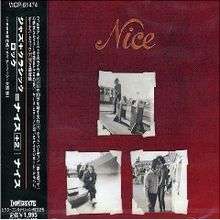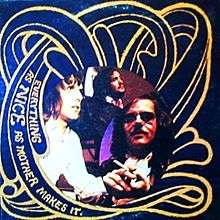Nice (The Nice album)
| Nice | ||||
|---|---|---|---|---|
 | ||||
| Studio album and Live album by The Nice | ||||
| Released | September 1969 | |||
| Recorded | Trident Studios, London, Mid 1969 (Tracks 1–4), Fillmore East, New York City, 9–10 April 1969 (Tracks 5–6) | |||
| Genre | Progressive rock | |||
| Length | 43:46 | |||
| Label | Immediate | |||
| Producer | The Nice | |||
| The Nice chronology | ||||
| ||||
| Alternative cover | ||||
 US album cover |
||||
| Professional ratings | |
|---|---|
| Review scores | |
| Source | Rating |
| Allmusic | |
| Robert Christgau | D+[2] |
Nice was the third album by the Nice; it was titled Everything As Nice As Mother Makes It in the US after Immediate's distribution changed from Columbia to Capitol. Nice had been initially released in the US with a slightly longer version of Rondo 69 not available on the UK or on the Capitol distributed US versions. The first US version of Nice was briefly reissued in 1973 by Columbia Special Products.
Continuing the Nice's fusion of jazz, blues, and rock, this album consists of studio (1–4) and live (5–6) tracks, the latter having become firm favourites in the band's live performances.
The album reached number 3 in the UK Album charts.[3]
Notes
The UK version of the album came in a gatefold sleeve, showing photographs of the band relaxing at an unknown location, the interior of which featured handwritten notes by Keith Emerson: Interesting to note that Keith was not at all happy with the album photos—they were not the ones he wanted them to use (In fact, he spent around one hour slamming his toilet door in his Drayton Gardens flat in sheer frustration!)
Azrael was the first thing I wrote with Lee – now revisited it relates to the Angel of Death. The 5/4 riff revolves round in a circular motion rather like the birth, life & death cycle, and proves to be an interesting medium to improvise in. The verses are taken in common time (4/4). The quote from Rachmaninoff's Prelude (in) C# Minor is intentional as when it was written. Rachmaninoff had Edgar Allan Poe's vision of a man coming back to life in the coffin after burial.
For the number I detuned the strings on the piano slightly to give it a "honky-tonk" effect which helped in creating an air of something ageing. I'd like to apologise to Amen Corner for not retuning the piano afterwards. They had to use the same piano after our session, unfortunately they didn't need a "Winifred Atwell's Other Piano" sound.
"Azrael" had been the B-side of the Nice's first UK single release, "Thoughts of Emerlist Davjack". As well as the Rachmaninoff quotation, the track relied on Lennie Tristano's Turkish Mambo. The album version is lighter in tone than the original, and taken at a slightly faster pace, but retains the menace of the original.
On Hang on to a Dream we have Duncan Browne to thank for the choir.
At one of our London Concerts I had the pleasure of performing Lalo's Symphonie Espaniol (sic) with violinist John Mayer who also leads Indo-Jazz Fusions.[4] We all thought the main riff too good to be forgotten after (a) one performance and set about giving it a new treatment. The words were written on a very dull journey from Newcastle to Birmingham and it became "Diary of an Empty Day".
People often ask us "why don't you play Blues". The Blues to us is a Universal language. Musicians from different speaking countries on first meeting will know exactly where they are on the basic blues structure. Brian, Lee and I have all been through this grounding and have said what we wanted to say in the blues for the time being through other groups. At rehearsals we'll usually warm up with a twelve bar. That's how the opening of "For Example" happened. However we didn't leave it there. The B minor blues moves into its relative major of D for the main theme then back again. The movement in E which follows is rather Hendrix-inspired after which the original D major theme is given a "Gregorian" feel and a 6/8 jazz waltz treatment in F. It is as the title says an Example.
The track added jazz players (including Joe Newman and Pepper Adams) with musical figures reminiscent of the work of Oliver Nelson as well as a section inspired by Gregorian chant and fleeting references to the Beatles' "Norwegian Wood".
Side 2 [tracks 5 & 6] was recorded on our first live appearance in New York at Fillmore East. Here we have Rondo '69. After the performance an urgent telegram was sent back to England- "please send more trousers".
She once belonged to Bob Dylan. She now belongs to you, me and anyone else who cares to listen. Keith Emerson.
Quotes of the theme to the film The Magnificent Seven can also be heard.
The live version of "Rondo" was also performed by Emerson, Lake & Palmer at the Isle of Wight Festival in 1970.
Track listing
Side one
- "Azrael Revisited" (Keith Emerson, Lee Jackson) – 5:52
- "Hang on to a Dream" (Tim Hardin) – 4:46
- "Diary of an Empty Day" (Music: Edouard Lalo[5] arr. by Emerson, lyrics: Jackson) – 3:54
- "For Example" (Emerson, Jackson) – 8:51
Side two
- "Rondo '69'" (Brubeck, Emerson, Jackson, Davison) – 7:53
- "She Belongs to Me" (Bob Dylan) – 12:15
Personnel
- Keith Emerson – keyboards
- Lee Jackson – bass guitar, vocals
- Brian Davison – drums
References
- ↑ "allmusic ((( Nice > Overview )))". allmusic.com. Retrieved 3 October 2009.
- ↑ Christgau, Robert (29 January 1970). "Consumer Guide (7)". The Village Voice. New York. Retrieved 29 April 2013.
- ↑ "Chart Stats – The Nice – Nice". www.chartstats.com. Archived from the original on 24 July 2012. Retrieved 3 October 2009.
- ↑ who had appeared on the same bill as The Nice at the 1969 Isle of Wight Festival
- ↑ http://www.last.fm/music/The+Nice/_/Diary+Of+An+Empty+Day/+wiki
External links
- The Nice: Nice at Discogs (list of releases)